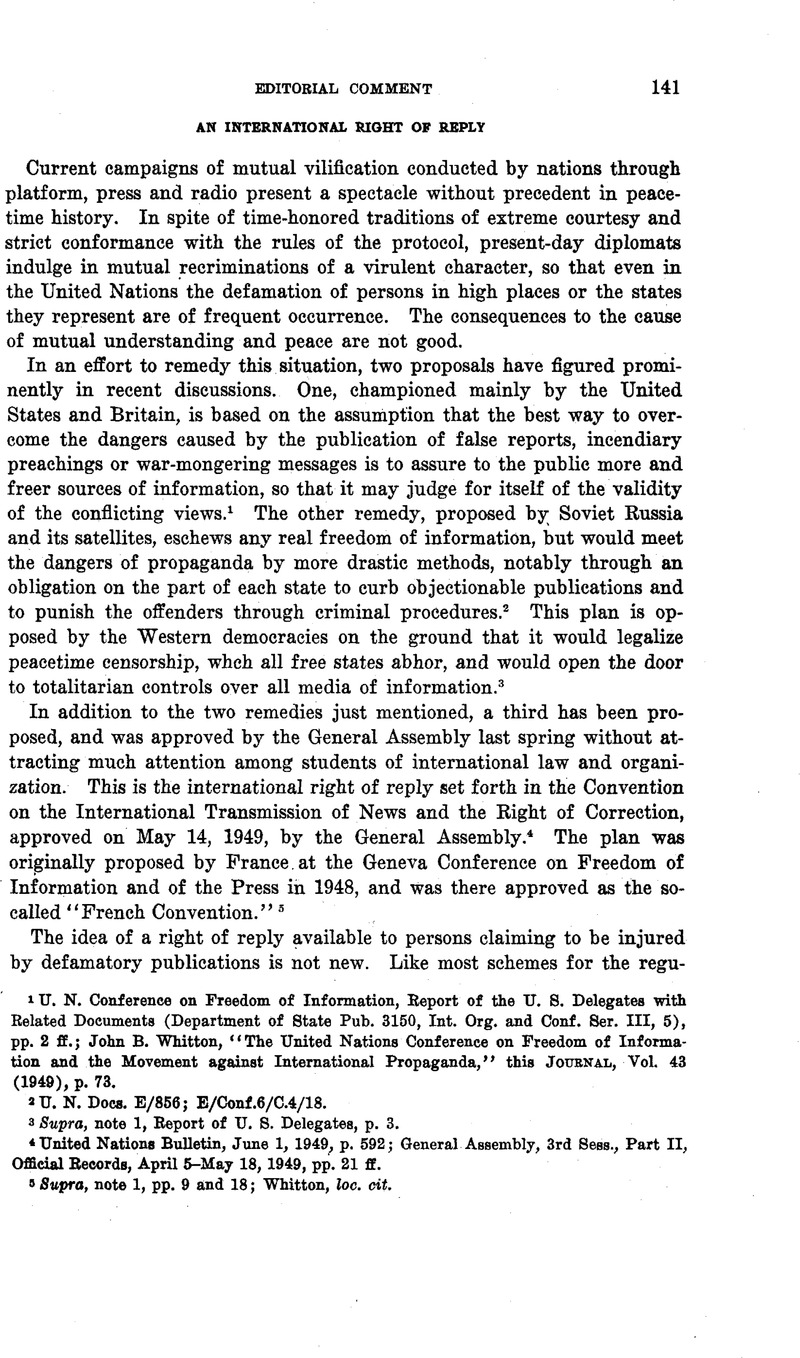Published online by Cambridge University Press: 20 April 2017

1 U. N. Conference on Freedom of Information, Report of the U. S. Delegates with Related Documents (Department of State Pub. 3150, Int. Org. and Conf. Ser. III, 5), pp. 2 ff.; Whitton, John B., “The United Nations Conference on Freedom of Information and the Movement against International Propaganda,” this journal, Vol. 43 (1949), p. 73 Google Scholar.
2 U. N. Docs. E/856; E/Conf.6/C.4/18.
3 Supra, note 1, Report of U. S. Delegates, p. 3.
4 United Nations Bulletin, June 1, 1949, p. 592; General Assembly, 3rd Sess., Part II, Official Records, April 5–May 18, 1949, pp. 21 ff.
5 Supra, note 1, pp. 9 and 18; Whitton, loc. cit.
6 Law of June 9, 1819. The principal French statutes covering the right of reply are: Law of March 25, 1822; Law of July 29, 1881, and Law of Sept. 29, 1919.
7 Andre, Perraud, Le Droit de Réponse (Paris, 1930)Google Scholar; Barbier, , Code Expliqué de la Presse (2d ed., Paris, 1911), Vol. I Google Scholar; Berraud-Charmantier, , Le Droit de Réponse (Paris, 1930)Google Scholar; Albert, Exhenry, Le Droit de Réponse en matière de presse dans les législations d’Europe (Thesis, Lausanne, 1929)Google Scholar.
8 Tribunal correctionnel de la Seine, 12e chambre, Feb. 1, 1929, reported in Revue Juridique Internationale de Radioélectricité, 5th year (1929), p. 57; affirmed on appeal in Court of Appeals, Paris, Nov. 27, 1929, ibid., 6th year (1930), p. 36.
9 Exhenry, op. cit.; Zechariah, Chafee, Jr., “Possible New Remedies for Errors in the Press,” Harvard Law Review, Vol. LX (Nov., 1946), pp. 1 ff.Google Scholar; Bichard, C. Donnelly, “The Bight of Beply: An Alternative to an Action for Libel,” Virginia Law Review, Vol. 34 (Nov., 1948), pp. 867 ffGoogle Scholar.
10 Chafee says of the libel action: “The crude Anglo-Saxon notion of vindicating honor by getting cash has become unsatisfactory to many decent people. They want a less sordid and more convenient procedure, which will focus its attention on what most concerns them, the mistakes in the defendant’s statement. It would be desirable for a court to be able to do something tangible to reduce the injurious effect of those mistakes, without having to bother about any of the hard-fought questions of damages which now take up so much time in a libel suit.” Loc. cit., p. 7. “A successful libel suit is, at best, almost as unusual as a successful action to break a will. It is the rare exception. Donnelly, loc. cit., p. 874.
11 Chafee, Donnelly and Exhenry, loc. cit. Also, Ignace, Rothenberg, “The Right of Reply to Libels in the Press,” Journal of Comparative Legislation and International Law, 3d series, Vol. XXIII, Pt. I (February, 1941), pp. 38 ff.Google Scholar
12 Donnelly, loc. cit., p. 892. Text in Nevada Comp. Laws (Hillyer, 1929), sec. 10506.
13 Lord Campbell’s Libel Act of 1843, 6 and 7 Vict., c. 96, Sees. 1, 2 (1843); American statutes cited and discussed by Chafee, loc. cit., p. 18, Donnelly, loc. cit., p. 892; Arthur, and Crosman, , The Law of Newspapers (2d ed., 1949), pp. 240 ff.Google Scholar, and Appendix C, where the statutes are collected.
14 Lapie, , “Droit de réponse et radiophonie,” Revue Juridique International de Radioéléctricité, 5th year (1929), p. 16 Google Scholar.
15 League of Nations Doc. C. 602.M.240.1931.IX.Disarmament 1931.IX, 19, p. 4.
16 League of Nations Bulletin of Information on the Work of International Organizations, VII, pp. 50–51.
17 Convention on the International Transmission of News and the Right of Correction, preamble. Supra, note 4.
18 Article 9.
19 Article 10.
20 Article 11.
21 If a contracting state fails to discharge its obligations with respect to the communiqué, the complaining state is permitted to give similar treatment to a communiqué later submitted to it by the defaulting state. A weaker sanction could hardly be imagined. True, a failure on the part of the defendant state to submit the communiqué brings into operation the important provision for action through the Secretary General, but apparently this action is not authorized if the government of the defendant submits the communiqué and the news dissemination agencies fail to print it. For by the mere submission the defendant state will have fulfilled its obligations under Art. 10.
22 See speech of Mr. Canham, United States Representative, in the General Assembly May 13, 1949. U. N. Doc. A/P.V.210, May 13, 1949.
23 Mr. Azkoul (Lebanon), found the scheme overcautious, and Mr. Kahali (Syria) called it a “mere mail-box function,” with inadequate sanctions for non-performance. U. N. Doc. A/P.V.211, May 13, 1949.
24 Mr. Canham remarked that the Nazi Government before 1939, in answer to reporting of its evil doings by foreign newspapers, would undoubtedly have used its right of correction to flood foreign offices of the democracies with alleged corrections. Supra, note 22.
25 British answer to protests from Napoleon, , Annual Register, Vol. 45 (1803), p. 665 Google Scholar. For response of U. S. Government to protests by Mexico against hostile propaganda in this country, see Hackworth, , Digest, Vol. II, p. 142 Google Scholar.